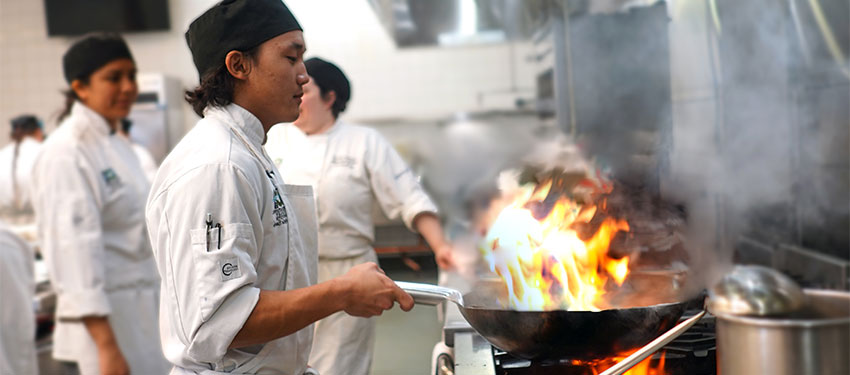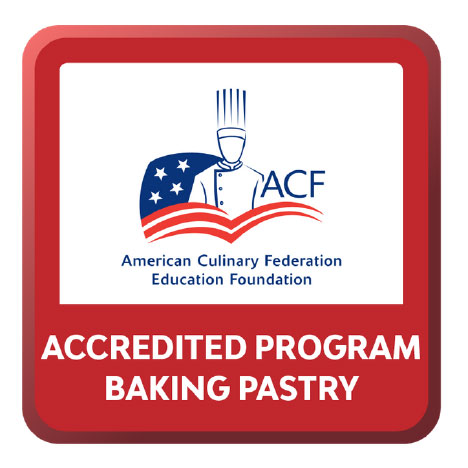Contact Us
Professional Cooking - Certificate
Program Requirements:
Admission Type:
General College Admission
Visit Admissions
Locations:
Contact:
Admissions
(843) 347-3186

 The Professional Cooking certificate program prepares students for positions in food
service operations such as hotels, country clubs, resorts, restaurants, healthcare
facilities, and catering operations.
The Professional Cooking certificate program prepares students for positions in food
service operations such as hotels, country clubs, resorts, restaurants, healthcare
facilities, and catering operations.
Students study both theory and practical kitchen applications of the requirements of quality food preparation. Education within this field offers a range of employment opportunities and career progression in the culinary arts, baking, and pastry preparations.
Program Information
Course Sequence and Progression Requirements
Most Professional Cooking (CUL, BKP, HOS) courses are offered only once each year, so following the recommended course sequence is extremely important.
Students are required to successfully complete one of the following: ServSafe Manager Food Safety Certification Course, ServSafe Sanitation Certificate, or CUL 104 Introduction to Culinary Arts course before progressing to the second semester.
Prerequisite courses require minimum grades of "C" or better. To graduate with an A.A.S. degree, a minimum GPA of 2.0 is required.
Student Resources
For more information, contact:
Joe Bonaparte - (843) 839-7004
Accreditation Status
The Culinary Arts program is accredited by the Accrediting Commission of the American Culinary Federation Educational Foundation.
For more information about HGTC's accreditations, click here.
Program Mission, Values, Goals & Outcomes
Mission
The mission of the Culinary Arts Technology program:
The International Culinary Institute of Myrtle Beach is committed to technical training
and post-secondary education in culinary arts and the hospitality industry. Core values
of continuous improvement, ethics and respect drive our department’s quest for culinary
excellence, professionalism, innovation and peer recognition. We are dedicated to
excellence in education through a learner-centered approach that fulfills the evolving
needs of our students and the marketplace
Values
The school trains students for entry-level career opportunities related to the culinary/hospitality industry. We strive to provide an environment for students to become active learners who possess the skills, knowledge, creativity, and ethical values which are necessary in the rapidly changing, culturally diverse hospitality professions.
Goals
- Delivering hands-on culinary education by faculty who exhibit excellence in teaching and have significant, related industry experience.
- Enhancing the department’s effectiveness by promoting open communications, and teamwork among faculty and students.
- Holding both faculty and students to the highest standards for work delivered.
- Graduating students that will be capable of contributing positively to a team, providing quality products and services in a safe, sanitary, professional and cost-effective manner.
Objectives
Upon successful completion of the program, graduates should be able to:
- Prepare standardized recipes using a variety of cooking, baking and pastry techniques as well as appropriate equipment and tools.
- Produce various baked goods and a variety of international and classical pastries and desserts using basic as well as advanced techniques, which meet industry quality standards.
- Design, produce, assemble and decorate display and wedding cakes using various finishing methods which meet industry quality standards.
- Describe and perform tasks related to common business practices within the foodservice
industry including inventory, menu planning, cost control and food purchasing.
- Seek employment in retail, commercial and institutional food service settings in entry-level job positions.
Career Outlook & Employment Opportunities
HGTC's Professional Cooking Certificate graduates will find employment in the following areas:
- Restaurants
- Bake shops
- Hotels and resorts
- Cruise ships
- Healthcare facilities
- Catering operations
For more information about careers, visit O*Net Online for an overview of South Carolina and National earnings statistics, and Career Services for more employment, career, and professional development resources.
Students who complete this certificate are eligible for ServSafe certification and
Culinary Federation Certification as a Culinarian.
Required Courses and Sample Schedules
Certificate Requirements: Profession Cooking |
||
| Component | Course Title | Semester Credit Hours |
| BKP 119 | Introduction to Baking and Pastry | 3 |
| CUL 104 | Introduction to Culinary Arts | 3 |
| CUL 105 | Kitchen Fundamentals | 3 |
| CUL 112 | Classical Foundations of Cooking | 3 |
| CUL 113 | Success in Hospitality Studies | 1 |
| CUL 118 | Nutritional Cooking | 3 |
| CUL 128 | Culinary Management and Human Resources | 3 |
| CUL 129 | Storeroom and Purchasing | 3 |
| CUL 215 | Cuisine of the Americas | 3 |
| CUL 277 | SCWE in Culinary Arts "Internship" | 3 |
| CREDITS | 28 | |
| TOTAL CREDIT HOURS | 28 | |
Sample Schedule: Professional Cooking Certificate |
||
| First Semester - Fall | Course Title | Semester Credit Hours |
| CUL 104 | Introduction to Culinary Arts | 3 |
| CUL 105 | Kitchen Fundamentals | 3 |
| CUL 112 | Classical Foundations of Cooking | 3 |
| CUL 113 | Success in Hospitality Studies | 1 |
| CUL 129 | Storeroom and Purchasing | 3 |
| CREDITS | 13 | |
| Second Semester - Spring | ||
| BKP 119 | Introduction to Baking and Pastry | 3 |
| CUL 118 | Nutritional Cooking | 3 |
| CUL 128 | Culinary Management and Human Resources | 3 |
| CUL 215 | Cuisine of the Americas | 3 |
| CREDITS | 12 | |
| Third Semester - Summer | ||
| CUL 277 | SCWE in Culinary Arts "Internship" | 3 |
| CREDITS | 3 | |
| TOTAL CREDIT HOURS | 28 | |
